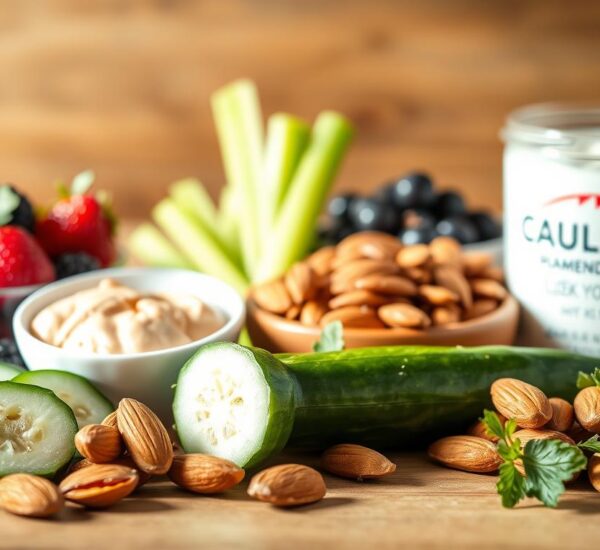Do you know how your food choices affect your health? With our busy lives, it’s key to make smart choices about healthy eating. A balanced diet gives our body the nutrients it needs to work right.
Choosing the right foods can boost our health and lower disease risks. For example, not skipping lunch and staying away from fast food can fight stress. For more tips on using diet to manage health issues, check out dietary strategies for controlling type 2.
Key Takeaways
- Eat a wide range of foods to ensure a balanced diet.
- Cut down on saturated fat and sugar.
- Make smart food choices to combat stress.
- Avoid skipping meals, like lunch.
- Limit your intake of fast food.
Understanding the Basics of Nutrition
Learning about nutrition is key to making better food choices for our health. Nutrition is about getting the nutrients our bodies need to work right. These nutrients are divided into macronutrients and micronutrients, each with its own role in our health.
What Are Macronutrients?
Macronutrients give us energy and help our bodies grow and repair. They are needed in big amounts and include carbohydrates, proteins, and fats. Carbohydrates give us energy and are in foods like whole grains, fruits, and veggies. Proteins help build and fix tissues, like muscles and bones, and are in lean meats, fish, eggs, and legumes. Fats are important for our brain, hormones, and vitamin absorption, and are in nuts, seeds, avocados, and olive oil.
| Macronutrient | Primary Functions | Food Sources |
|---|---|---|
| Carbohydrates | Energy source | Whole grains, fruits, vegetables |
| Proteins | Builds and repairs tissues | Lean meats, fish, eggs, legumes |
| Fats | Energy storage, hormone production | Nuts, seeds, avocados, olive oil |
The Role of Micronutrients
Micronutrients, like vitamins and minerals, are needed in small amounts but are very important. They help our immune system, nerves, and metabolism. For example, Vitamin C boosts our immune system and is in citrus fruits and leafy greens. Calcium is key for strong bones and is in dairy and fortified plant-based milk. Eating a variety of whole foods helps us get enough micronutrients. For more on healthy foods, check out our article on antioxidant-rich foods.
Importance of Hydration
Drinking enough water is vital for our nutrition. Water helps with body temperature, nutrient transport, and waste removal. Drinking at least eight glasses a day is recommended, but needs can change based on activity, climate, and health.
Knowing about nutrition helps us make better food choices. It teaches us about macronutrients, micronutrients, and hydration. This knowledge helps us follow dietary guidelines and track calories, supporting our health and well-being.
The Benefits of a Balanced Diet
We know that a balanced diet is key to our health. It offers many benefits, like more energy and a stronger immune system. Eating a variety of whole foods helps us stay healthy and feel good.
Improved Energy Levels
A balanced diet gives our body the nutrients it needs to work well. Foods like whole grains, fruits, and veggies keep our energy up all day. Adding lean proteins and healthy fats, like nuts and avocados, boosts energy too.
Enhanced Mood and Mental Clarity
Eating foods rich in omega-3s, vitamins, and minerals can improve our mood and mental focus. Salmon, walnuts, and leafy greens are great for our brain. Making smart food choices helps us handle stress better and feel mentally sharp.
Strengthened Immune System
Eating a variety of fruits, veggies, and whole grains boosts our immune system. These foods are full of antioxidants and nutrients that help our immune system. A strong immune system keeps us safe from getting sick.
Creating a Balanced Plate
To eat mindfully, we must learn to make a balanced plate. A balanced plate is key for a healthy diet and well-being. By controlling portions and choosing the right foods, our meals become both nutritious and satisfying.
Portion Control Techniques
Mastering portion control is vital for a balanced plate. Using smaller plates helps us eat less and control calories. It’s also important to be mindful of serving sizes and avoid overeating.
Try the hand method for portion control. A protein serving should be the size of our palm. A grain serving should fit in our cupped hand. This method makes balancing meals easy without measuring.
Recommended Food Groups
A balanced plate includes various food groups. Whole grains like brown rice and whole-wheat bread offer fiber and nutrients. Lean proteins such as chicken and legumes are essential for muscle repair and energy.
We should also include colorful vegetables and fresh fruits for vitamins and minerals. Adding healthy fats like nuts and avocados supports brain function and vitamin absorption. By mixing these groups, we support our health.
Tips for Meal Planning
Effective meal planning is key for a balanced diet. Planning meals ahead helps us make healthier choices and avoid unhealthy options. Start by making a weekly meal plan with a variety of dishes.
Another tip is to prep in bulk. Cooking large batches of food on the weekend saves time and ensures healthy meals are always ready. Also, keep healthy snacks like fruits and nuts handy to avoid unhealthy choices.
Common Diet Myths Debunked
It’s important to know the truth about diet myths. With so much information out there, it’s easy to get confused. We’ll clear up some common diet myths that have misled us.

Carbs Are Your Enemy?
Many think carbs are bad for you. But, not all carbs are the same. Whole grains, fruits, and vegetables are full of nutrients and fiber. They’re key to a balanced diet.
It’s the processed carbs that can cause issues. They can raise blood sugar and insulin levels. Our bodies need carbs for energy. We should choose the right carbs and watch our portions.
Fats Make You Fat?
Some believe eating fat makes you gain weight. But, not all fats are the same. Healthy fats in nuts, seeds, avocados, and olive oil are good for us. They help with brain function, hormone production, and vitamin absorption.
Adding healthy fats to our diet can help with weight management. They keep us full and support a balanced metabolism.
Skipping Meals for Weight Loss
Some think skipping meals helps with weight loss. But, it can lead to nutrient deficiencies and slower metabolism. Skipping meals often means we eat more later, leading to poor choices and weight gain.
Eating regular, balanced meals keeps our energy up and supports health. It’s about finding a balance that fits our lifestyle and nutritional needs.
Understanding these diet myths helps us make better choices. It’s about creating a personalized nutrition plan that’s right for us. This promotes overall well-being.
The Role of Dietary Supplements
Dietary supplements are key to our health and well-being. They help fill gaps in our diet due to various reasons. It’s important to know when and how to use them.
When to Consider Supplements
We should think about supplements when our diet lacks essential nutrients. This can be due to a restrictive diet, health conditions, or increased needs during pregnancy or old age. Understanding nutrition’s impact on mental health helps us make smart choices about supplements.
Types of Common Supplements
There are many dietary supplements out there, each for different needs. These include:
- Multivitamins
- Omega-3 fatty acids
- Probiotics
- Vitamin D
- Minerals like calcium and iron
Each supplement has its own purpose, like boosting energy or supporting heart health.
To understand supplements better, let’s look at a comparison table:
| Supplement Type | Primary Benefit | Target Group |
|---|---|---|
| Multivitamins | Fills nutritional gaps | General population |
| Omega-3 fatty acids | Supports heart health | Individuals with heart conditions |
| Probiotics | Enhances digestive health | Individuals with digestive issues |
| Vitamin D | Supports bone health | Individuals with vitamin D deficiency |
Best Practices for Supplement Use
To maximize the benefits of supplements, follow these best practices. Always talk to a healthcare professional before starting, choose high-quality products, and be aware of interactions with medications. Following the recommended dosage and being patient is also key, as supplements take time to show effects.
By understanding supplements and using them wisely, we can actively improve our health. Remember, supplements are meant to enhance a healthy diet, not replace it.
Special Diets Explained
Understanding special diets can change your life. There are many diets out there, each catering to different needs and tastes. It’s key to explore these options to make better food choices.
Special diets are great for those with health needs or wanting a healthier life. Knowing how these diets work helps us make better food choices. This can improve our health and well-being.
Plant-Based Diets
Plant-based diets are becoming more popular for their health benefits. They focus on whole, unprocessed plant foods. This can help your heart and lower the risk of chronic diseases.
To follow a plant-based diet well, eat a variety of vegetables and keep fruits handy. This ensures you get all the vitamins and minerals you need. Also, include plant-based proteins like legumes, beans, and tofu to meet your protein needs.
Ketogenic Lifestyle
The ketogenic diet, or keto diet, is high in fat and low in carbs. It helps with weight loss and blood sugar control. By cutting down carbs, your body burns fat for energy instead.
To live a ketogenic lifestyle, focus on healthy fats, moderate protein, and low-carb veggies. Planning your diet carefully is key to getting all the nutrients you need while staying in ketosis.
Mediterranean Diet
The Mediterranean diet is all about balance. It includes whole grains, fruits, veggies, lean proteins, and healthy fats. It’s good for your heart and can lower the risk of chronic diseases.
To follow the Mediterranean diet, eat whole, unprocessed foods. Try to have a variety of colors on your plate. Enjoy meals with others and savor your food for a better dining experience.
By exploring and adopting these special diets, we can take charge of our health. Whether you want to manage weight, improve health, or just live healthier, there’s a diet for you.
Nutritional Needs Across Life Stages
It’s important to know what we need nutritionally at different times in our lives. Our diets change as we grow and age. This helps us stay healthy and full of energy.
Nutrition for Infants and Children
Young ones need lots of nutrient-rich foods to grow fast. Breast milk is best for babies, giving them key nutrients and antibodies. As kids get older, they should eat a variety of foods like fruits, veggies, whole grains, and lean proteins.
Diet Tips for Teens
Teens are always on the go and need lots of energy. Eating a balanced diet with whole grains, lean proteins, and lots of fruits and veggies helps a lot. It’s also good to cut down on processed and sugary foods.
Diet Considerations for Older Adults
Older folks might need different foods because of changes in their health and how their body works. A diet that supports their health, like bone health, is key. They should aim for personalized nutrition that fits their needs.
| Life Stage | Nutritional Needs | Key Foods |
|---|---|---|
| Infants | High in protein and healthy fats for growth | Breast milk, pureed fruits and vegetables |
| Children | Balanced diet for growth and energy | Whole grains, lean proteins, fruits, and vegetables |
| Teens | High energy needs, balanced diet | Whole grains, lean proteins, fruits, vegetables, and healthy snacks |
| Older Adults | Tailored to health needs, potentially lower calories | Nutrient-dense foods, possibly supplements for specific needs |
In conclusion, our nutritional needs change a lot as we age. By eating nutrient-rich foods and following personalized nutrition plans, we can stay healthy all our lives.
Meal Prep Tips for Busy Schedules
Meal prep is a simple way to eat healthy, even when we’re busy. By planning and preparing meals ahead, we save time, reduce waste, and get the nutrients we need.
Quick and Healthy Recipes
Having quick and healthy recipes is key to meal prep success. These recipes should be easy to make and full of nutrients. Salads, stir-fries, and one-pot dishes are great choices. For example, a salad jar with greens, veggies, and protein can be made in minutes.
Another quick option is a breakfast burrito with scrambled eggs, black beans, and cheese. It’s easy to make in bulk and can be stored for later.
| Recipe | Prep Time | Nutritional Highlights |
|---|---|---|
| Salad Jar | 10 minutes | High in fiber, vitamins |
| Breakfast Burrito | 15 minutes | Good source of protein, fiber |
| Stir-Fry | 20 minutes | Rich in vitamins, minerals, antioxidants |
Time-Saving Kitchen Tools
The right kitchen tools can make meal prep faster. A slow cooker cooks meals for hours without needing to watch it. A food processor quickly chops, slices, and purees ingredients.
- Slow Cooker
- Food Processor
- Instant Pot
- Sharp Knives
- Cutting Boards
Batch Cooking Strategies
Batch cooking means making big batches of ingredients or meals. This is great for saving time during the week. Grains, soups, and stews are perfect for batch cooking.
For example, making a big batch of brown rice or quinoa at the start of the week can be used for many meals. A large pot of lentil soup can also be portioned out and stored for later.

Reading Nutrition Labels
Learning to read nutrition labels is key for a better diet and health. By understanding what these labels say, we can choose better foods.
Good nutrition label reading covers a few important points. First, knowing the serving size and how many servings are in a container is vital. This helps us track calories and control our nutrient intake.
Understanding Serving Sizes
The serving size on labels is the base for nutrition info. It’s not always what we eat in one go. Knowing the serving size helps us manage our calorie intake better.
For instance, if a label says one cup is a serving but the container has two, eating the whole thing means we’re having two servings. This is key for accurate calorie tracking.
Identifying Healthy Ingredients
It’s also important to spot healthy ingredients on labels. Nutrient-rich foods are high in good stuff like vitamins and minerals but low in calories. Foods like whole grains, lean proteins, and many fruits and veggies are good examples.
To find healthy ingredients, check the ingredient list. The first items listed are the most present. Choosing foods with wholesome ingredients first helps follow dietary guidelines for a balanced diet.
Recognizing Hidden Sugars
Another key part of label reading is spotting hidden sugars. Many foods have added sugars that add calories but no nutrition. Look for total sugar content and know the different names for sugar (like high fructose corn syrup) to make better choices.
| Nutrient | What to Look For | Why It Matters |
|---|---|---|
| Sugars | Total sugars, added sugars | High sugar intake can lead to health issues like diabetes and heart disease. |
| Fats | Saturated fats, trans fats | Excessive consumption can increase the risk of heart disease. |
| Sodium | Sodium content per serving | High sodium intake can lead to high blood pressure. |
Mastering nutrition label reading helps us manage our diet better. It’s about being informed and controlling what we eat.
The Impact of Nutrition on Mental Health
Nutrition is key to our mental health, affecting our mood and brain function. What we eat influences how we feel. By knowing this, we can choose foods that help our mental health.
Gut-Brain Connection
The gut and brain talk to each other through chemicals. A healthy gut is vital for our mental health. Eating foods high in fiber helps keep our gut healthy.
Research links an unhealthy gut to mental problems like anxiety and depression. So, eating foods that support a healthy gut is important.
Foods That Boost Mood
Some foods can make us feel better. Omega-3 fatty acids are good for our brain. Foods like salmon and walnuts help our heart and brain health.
Complex carbs in whole grains, fruits, and veggies also help our mood. They boost serotonin, which fights depression.
Nutrients for Cognitive Function
Vitamins like D and magnesium are good for our brain. Vitamin D is in fish, dairy, and some cereals. Magnesium is in greens, nuts, and seeds.
These nutrients help our brain work better. Getting enough of them is key to keeping our brain sharp.
The Role of Exercise in Nutrition
Exercise and nutrition work together to boost our health and help with weight control. Doing regular physical activities and eating well are key to staying healthy. Exercise not only burns calories but also boosts mood and meets our body’s nutritional needs.
Combining Diet and Physical Activity
Mixing a balanced diet with exercise is vital for the best health. This combo helps manage weight, boosts energy, and improves both physical and mental health. By eating healthy and exercising, we can lower the risk of serious diseases.
Pre- and Post-Workout Nutrition
Nutrition is key for better workout performance and recovery. Eating a meal with complex carbs and lean protein before working out helps with endurance and strength. After, eating carbs and protein helps muscles recover and replenishes energy.
Staying Active for Better Health
Being active is essential for better health. Regular exercise keeps the heart healthy, helps with weight control, and boosts mental health. It’s important to mix different exercises like cardio, strength training, and flexibility to stay fit.
| Activity | Nutritional Focus | Benefits |
|---|---|---|
| Cardio Exercises | Complex Carbohydrates | Improved Heart Health |
| Strength Training | Lean Protein | Muscle Growth and Repair |
| Flexibility Exercises | Adequate Hydration | Enhanced Flexibility and Reduced Injury Risk |
Setting Realistic Nutrition Goals
On our journey to healthier living, setting realistic nutrition goals is key. It helps us succeed in eating well and managing our weight. By making our goals personal, we can meet our unique needs.
Effective Goal Setting Strategies
To reach our nutrition goals, we need to set SMART objectives. This means our goals should be Specific, Measurable, Achievable, Relevant, and Time-bound. It helps us plan, track, and stay motivated.
Monitoring Progress
Keeping track of our progress is essential. We can use food diaries or mobile apps to monitor our eating. This way, we can adjust our habits to meet our goals.
Maintaining Motivation
Staying motivated is important. We can plan meals, vary our veggies, and keep healthy snacks handy. This helps us keep moving forward towards better eating habits.



